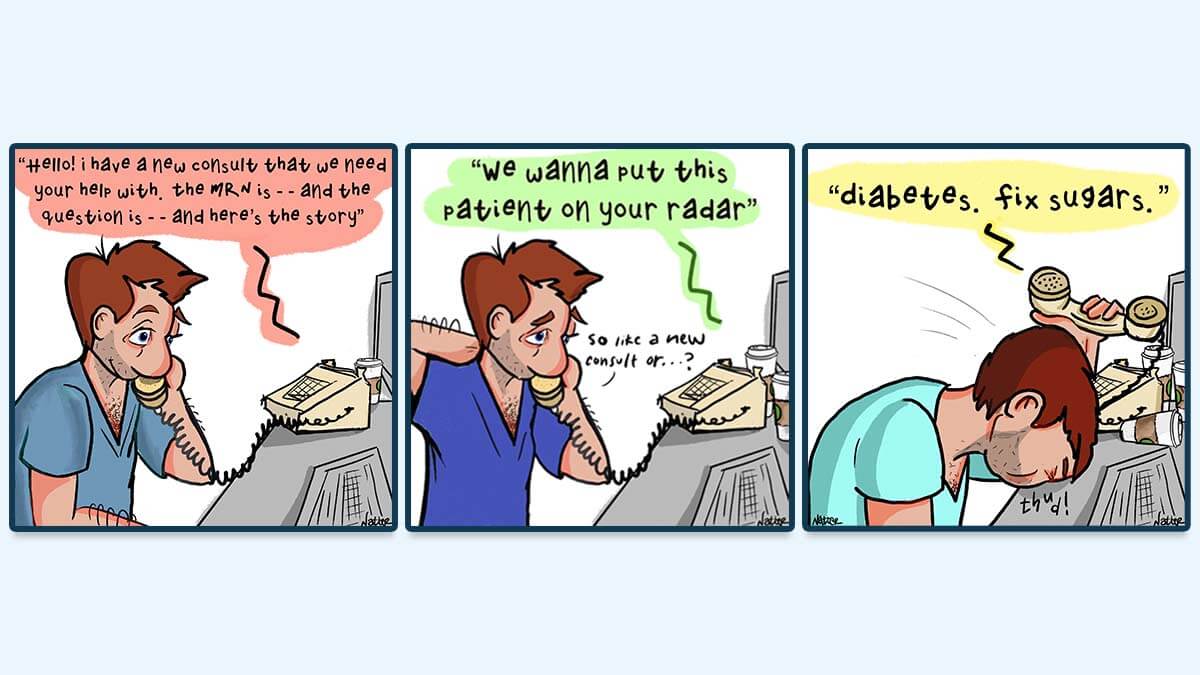You are just about to wrap up rounds, your feet hurt, your to-do list is longer than your CVS receipt and your N-95 has kept you from getting in that first sip of morning coffee. You’re tired. You’re stressed. Your pager won’t shut up. You better get a move on with your to-do’s but first things first: gotta call your consults.
What is a Consult?
What is a consult? When a patient’s primary team has a complicated clinical scenario that they have a question about, they can phone a friend – or in this case- they can consult a specialist. This could be Cardiology for a patient who is at high concern for having a myocardial infarction, Infectious Disease for a patient spiking nightly fevers despite appropriate antibiotic coverage, or in my case, Endocrinology for an incidental adrenal mass found in the setting of hypertension. Upon receiving the consult request, a fellow will field the consult, see the patient, write a note with recommendations, and staff it with their attending prior to getting back to the primary team with the official recommendations. Ideally, the fellow will try to teach the primary team in the process. Typically, the primary team will attempt to manage the initial concern prior to reflexively calling a consult. However, once it becomes clear they need help, the consult is warranted. A consult is different from a referral since referrals are for outpatient matters. In contrast, a consult takes place while the patient is inpatient and assumes the patient will continue to receive care under the primary team that has been taking care of them.
For every consult a fellow receives, it will amount to anywhere between 1.5 – 2 hours of work, which is often in addition to a fellow’s outpatient clinic responsibilities. For these reasons, a tension can arise when an abundance of “soft” consults (aka a clinical question that could likely have been answered by the primary team on their own) find their way on a fellow’s list.
How to Properly Call a Consult
Previously when I was a medical student rotating on my clinical rotations, calling a consult scared the hell out of me. What if the fellow is mean to me? Am I doing this right? What is my “question”? Do I have all the right information to give them? What if they say “no”? Then as an intern I was too tired and busy to be scared. I just needed to get through my to-do’s and getting my consults called was one of them. As a resident, I wanted to present a convincing case to the fellow as to feel validated in calling “an appropriate consult” but I would also feel a sense of guilt for bothering the fellow (especially overnight) and a little silly if it would be something I should be able to handle on my own. Now, a year into fellowship, I understand all sides of this dreaded consult culture. So, here are a few pointers:
COLLECT YOUR THOUGHTS.
WHY.
It is imperative to understand a few key things prior to picking up the phone. First, ask yourself “why am I calling this consult?” If the answer is “because my attending (or resident) said so,” go back to them and discuss the finer points of why its warranted. If you cannot make a case for why the consult is being called, speak up and flesh out the need for the consult prior to calling it. From there, classify the urgency of this consult – how time sensitive are these consultant recommendations to the patients care?
WHEN.
Always match up the urgency (see above) of the consult with the time of day. This means if the consult is urgent, call no matter the time of day or night, alternatively, if this is a non-urgent consult and it is after normal business hours, consider calling the consult the following morning. Keep in mind, the fellows are there to field consults and patient care is always paramount so never be dissuaded from calling a consult solely based on time of day or night.
WHO.
Introduce yourself, what team you are calling from and be sure you have the patient’s name and MRN or any other identifying information the fellow may need. It is also wise to confirm you are speaking to the correct fellow and service. There have been a handful of occasions I had a full conversation with a team who thought they were talking to Endocrine Surgery (I cut down blood sugars not strap muscles).
WHAT.
Know the patient’s story, the reason to call a consult (aka “the question”), and whatever ancillary information (labs, imaging, vitals, etc) the consultant may ask about. I don’t really need to hear the gory details and I prefer to cut to the chase by knowing the question up front followed by a 1-2 liner about the patient and their course.
HOW.
I am big believer in having a basic “script” or rubric in your head when calling a consult. Short and sweet is always best. Be direct, kind, and appreciative. An example script could be:
“Hi this is Mike, I am one of the residents calling from the medical oncology team. I have a new consult for the endocrinology team, can I give you the name and MRN? OK, here it is Jane Smith 555555. Our question is we found a pituitary lesion incidentally and already drew the pituitary labs but are unsure how to interpret some of them. The story: This is a 79 year old female with a past medical history of uterine cancer who was admitted for chemotherapy. During her hospital course we obtained a brain MRI for concern of new seizure activity which was significant for blah blah blah…Thank you!”
At this stage, the consultant may ask for some additional information or give preliminary recommendations such as additional labs to draw. Usually, the consultant has 24 hours to see the patient, write the note and staff it with an attending, but often it will happen much sooner than that.
What is important to note is that fellows usually have clinic in addition to fielding consults. This means you may be talking to them while they are in the middle of a busy clinic schedule and may not be able to pull up the patient’s chart or run to the see consult in that moment. Also important to note, many fellows take “home call” so if you call a consult at 2AM, you are likely waking them up, which is entirely expected and accepted. However, it underscores the importance in recognizing the urgency of the consult. If it cannot wait until the morning, it’s always best to call and be sure to have all of your data straight when discussing the case.
When we call a consult it should not feel like a battle, but courtesy does go a long way. Introduce yourself. Know your question and your patient’s details. Say thank you. Lastly, a fellow should never make you feel guilty for calling a consult.
At the end of the day, we all want the same thing: excellent patient care.




